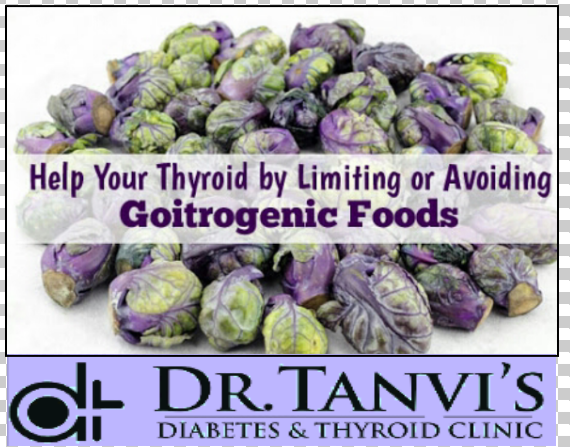
Dr. Tanvi Chopda
CCMTD, CCEBDM, C.Diabetology, American Diabetes Association, DOMS, MBBS · Endocrinologist ·
Many people ask me "Can I eat cabbage or cauliflower/broccoli since I have a thyroid condition?" let me try to give the answer in scientific way.
What are goitrogens?
Goitrogens are substances that interferes with thyroid hormone production causing enlargement of thyroid. This enlargement also known as a goiter.
Different goitrogenic substances are present in various foods.
Cruciferous vegetables such as cabbage, broccoli, and cauliflower contain glucosinolates, which blocks iodine uptake into the thyroid.
Luckily, these vegetables are only goitrogenic in the raw state. Cooking or lightly steaming will deactivate the glucosinolates,
Thus diminishing the goitrogenic activity. While consuming cooked cruciferous vegetables is preferred, occasionally eating small amounts of these foods in the raw states should not aggravate autoimmune thyroid conditions.
1. Iodine deficiency induced hypothyroidism should not consume as they cause further suppression of thyroid activity
However
2. Hashimoto's (most common cause of hypothyroidism) do not have iodine deficiency, and eating such otherwise very healthy vegetables is not of particular concern.
People with sub-clinical hypothyroidism (when their thyroid is still producing its own thyroid hormone and TSH is slightly elevated) may find that eating lots of goitrogens may suppress some of their own thyroid hormone production.
Soy and canola are two goitrogens that should be avoided in those with hashimoto's.
Canola-- should be avoided in all individuals with hashimoto's- it's highly processed and made from genetically modified crops.
Soy- is a goitrogen. It blocks the activity of the TPO enzyme (important for thyroid hormone formation) soy has been linked to the development of autoimmune thyroiditis and should be avoided by those with hashimoto's.
List of goitrogens foods
Bamboo shoots
Broccoli
Broccolini
Brussels sprouts
Cabbage
Collard greens
Horseradish
Kohlrabi (Ganth Gobhi)
Mustard greens (Sarso ka Saag)
Peaches
Peanuts (Moongphali)
Pears
Pine nuts (Cheedh ki Supari)
Radishes (Muli)
Spinach (Palak)
Strawberries
Sweet potato
Turnips (White beetroot- Saljam)
Therefore, although everyone is different, most people with hashimoto's should be able to eat most goitrogens, even in their raw state, (with the exception of soy and canola).
Thank you for reading it. I hope it will be helpful to you.
What are goitrogens?
Goitrogens are substances that interferes with thyroid hormone production causing enlargement of thyroid. This enlargement also known as a goiter.
Different goitrogenic substances are present in various foods.
Cruciferous vegetables such as cabbage, broccoli, and cauliflower contain glucosinolates, which blocks iodine uptake into the thyroid.
Luckily, these vegetables are only goitrogenic in the raw state. Cooking or lightly steaming will deactivate the glucosinolates,
Thus diminishing the goitrogenic activity. While consuming cooked cruciferous vegetables is preferred, occasionally eating small amounts of these foods in the raw states should not aggravate autoimmune thyroid conditions.
1. Iodine deficiency induced hypothyroidism should not consume as they cause further suppression of thyroid activity
However
2. Hashimoto's (most common cause of hypothyroidism) do not have iodine deficiency, and eating such otherwise very healthy vegetables is not of particular concern.
People with sub-clinical hypothyroidism (when their thyroid is still producing its own thyroid hormone and TSH is slightly elevated) may find that eating lots of goitrogens may suppress some of their own thyroid hormone production.
Soy and canola are two goitrogens that should be avoided in those with hashimoto's.
Canola-- should be avoided in all individuals with hashimoto's- it's highly processed and made from genetically modified crops.
Soy- is a goitrogen. It blocks the activity of the TPO enzyme (important for thyroid hormone formation) soy has been linked to the development of autoimmune thyroiditis and should be avoided by those with hashimoto's.
List of goitrogens foods
Bamboo shoots
Broccoli
Broccolini
Brussels sprouts
Cabbage
Collard greens
Horseradish
Kohlrabi (Ganth Gobhi)
Mustard greens (Sarso ka Saag)
Peaches
Peanuts (Moongphali)
Pears
Pine nuts (Cheedh ki Supari)
Radishes (Muli)
Spinach (Palak)
Strawberries
Sweet potato
Turnips (White beetroot- Saljam)
Therefore, although everyone is different, most people with hashimoto's should be able to eat most goitrogens, even in their raw state, (with the exception of soy and canola).
Thank you for reading it. I hope it will be helpful to you.





Thanks for sharing this wonderful post. It is important and very useful.
ReplyDeleteBest diabetologist and endocrinologist in Mumbai